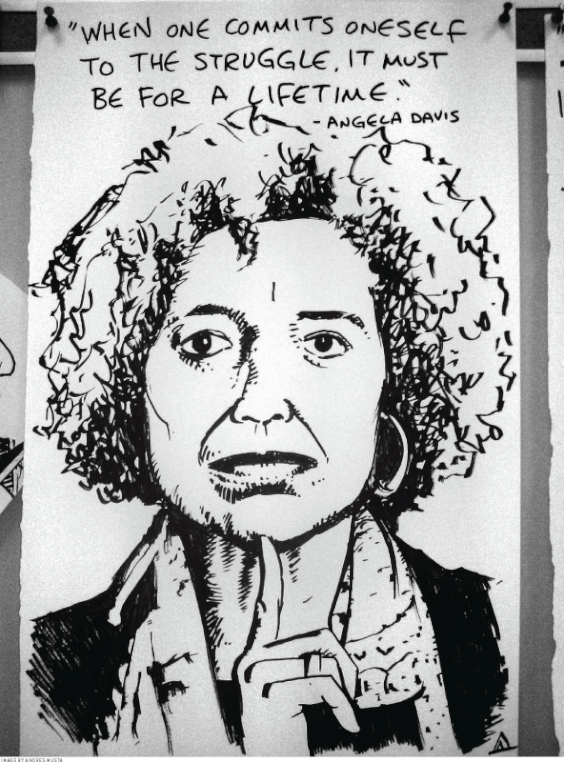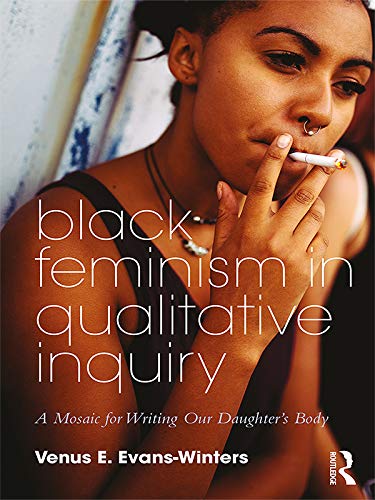You will notice that most webpages at this website have a corresponding song from the symposium's larger playlist (click here). Erykah Badu's "Bag Lady" (playing above) was chosen for this webpage on BLACK FEMINIST METHODOLOGIES.
|
We think of research methodology as so much more than prescriptive formulas and directions for how folx should gather, code, and analyze data. At the core root of Black Feminist Methodologies is a questioning of knowledge itself especially in a world that requires the dehumanization of Black girls, women, femmes, and gender-nonconforming folx; in schools that deliberately miseducate and harm young Black people; and in an academy that has consciously treated Blackness as inferior. Black Feminist methodologies must sound, be, and look like these Erykah Badu lyrics about not carrying all this toxicity with you and on you. Black Feminist methodologies mean that none of the ways that you have been previously educated, treated, and/or scholarly trained under white supremacy can come with you.
|
|

Because Black feminist methodologies/ knowing require a break from Enlightenment philosophies, we are calling these "Endarkened Epistemologies," as coined by Cynthia Dillard. In simplest terms, the Enlightenment refers to a body of late 17th-18th century thought and thinkers in Western Europe committed to improving humanity through reason and change--- it is very much the ideological foundation of Western education and philosophy. It is the place and time that also rationalized slavery and white settler colonialism and can never be disinvested from this fact. Black feminist research thus requires a kind of intellectual break that most Western scholars simply do not make.
We will do our best to also see and make historical connections without using the western, linear, Enlightenment framework that says: we started here, learned a lot, improved our thinking, and now we are chronologically someplace completely better and different. We want to de-whiten time so that we see the past as spaces that built out the logic in which we now live, not just a series of regrettable and long-gone mistakes. To account for temporality (a fancy word for time), we will use Jackie Jones Royster’s notion of rhetorical continuities, a framework she used in Traces of a Stream to make sense of the ways that Black women rhetors like Maria Stewart and June Jordan are writing in similar ways, for similar purposes, even though they lived 100 years apart. Together, we start by reading Saidiya Hartman’s “Venus in Two Acts.”
We will do our best to also see and make historical connections without using the western, linear, Enlightenment framework that says: we started here, learned a lot, improved our thinking, and now we are chronologically someplace completely better and different. We want to de-whiten time so that we see the past as spaces that built out the logic in which we now live, not just a series of regrettable and long-gone mistakes. To account for temporality (a fancy word for time), we will use Jackie Jones Royster’s notion of rhetorical continuities, a framework she used in Traces of a Stream to make sense of the ways that Black women rhetors like Maria Stewart and June Jordan are writing in similar ways, for similar purposes, even though they lived 100 years apart. Together, we start by reading Saidiya Hartman’s “Venus in Two Acts.”
More reading suggestions:
 Click here to learn more about this suggested background reading.
Click here to learn more about this suggested background reading.
- "Against Captivity: Black Girls and School Discipline Policies in the Afterlife of Slavery" by Connie Wun in Educational Policy (2016)
- "As Seen on TV: An Autoethnographic Reflection on Race and Reality Television" by Robin M. Boylorn in Critical Studies in Media Communication (2008)
- "Black Feminism in Qualitative Education Research" by Venus Evans-Winters in Black Feminism in Education: Black Women Speak Back, Up, and Out (2015)
- "Body of Knowledge: Black Queer Feminist Pedagogy, Praxis, and Embodied Text" by Mel Michelle Lewis in Journal of Lesbian Studies (2011)
- “Dancing After Life: Flexible Spacetimes of Black Female ResistDance” by Layla Zami in Dance Research Journal (2021)
- “Disciplinary Landscaping, or Contemporary Challenges in the History of Rhetoric” by Jacqueline Jones Royster in Philosophy & Rhetoric (2003)
- "I Must Become a Menace to My Enemies": Black Feminism, Vengeance, and the Futures of Abolition” by Stephen Dillon in GLQ: A Journal of Lesbian and Gay Studies (2022)
- “Intersectionality” by Brittany Cooper in Oxford Handbook (2015)
- “Intersectionality Undone: Saving Intersectionality from Feminist Intersectionality Studies” by Sirma Bilge in DuBois Review (2013)
- “Intersectionality: Mapping the Movements of a Theory” by Devon W. Carbado, Kimberlé Williams Crenshaw, Vickie M. Mays, Barbara Tomlinson in DuBois Review (2013)
- "Killing Me Softly or on the Miseducation of (Love and) Hip Hop: A Blackgirl Autoethnography" by Robin Boylorn in Qualitative Inquiry (2016)
- “The Last Word on Racism: New Directions for a Critical Race Theory” by Sharon P. Holland in South Atlantic Quarterly (2005)
- “Mathematics Black Life” by Katherine McKittrick in The Black Scholar (2014)
- "Queer of Color Agency in Educational Contexts: Analytic Frameworks From a Queer of Color Critique" by Edward Brockenbrough in Educational Studies (2015)
- “Seeing It for Wearing It: Autoethnography as Black Feminist Methodology” by Layla D. Brown-Vincent in Taboo (2019)
- "Some of Us Die: A Black Feminist Researcher’s Survival Method for Creatively Refusing Death and Decay in the Neoliberal Academy” by Esther O. Ohito in International Journal of Qualitative Studies in Education (2021)
- “The Race for Theory” by Barbara Christian in Feminist Studies (1988)
- "Radical Love: Black Philosophy as Deliberate Acts of Inheritance" by Kristie Dotson in The Black Scholar (2013)
- "A Ratchet Lens: Black Queer Youth, Agency, Hip Hop, and the Black Ratchet Imagination" by Bettina Love in Educational Researcher (2017)
- "(Re)Presenting Shug Avery and Afrekete: The Search for a Black, Queer, and Feminist Pleasure Praxis" by Kaila Adia Story in The Black Scholar (2015)
- "Research as an Aesthetic Process: Extending the Portraiture Methodology" by Adrienne D. Dixson, Thandeka K. Chapman, and Djanna A. Hill in Qualitative Inquiry (2005)
- “Resituating the Crossroads: Theoretical Innovations in Black Feminist Ethnography” by Amanda Walker Johnson in Souls (2017)
- “ 'Speaking into the Void'? Intersectionality Critiques and Epistemic Backlash" by Vivian May in Hypatia (2014)
- "The Substance of Things Hoped for, the Evidence of Things Not Seen: Examining an Endarkened Feminist Epistemology in Educational Research and Leadership" by Cynthia Dillard in International Journal of Qualitative Studies in Education (2000)
- "Trans Capable: Fungibility, Fugitivity, and the Matter of Being" by C. Riley Snorton in Black on Both Sides: A Racial History of Trans Identity (2017)
- “Uncovering Black Girlhood(s): Black Girl Pleasures as Anti-respectability Methodology” by Porshé R. Garner, Dominique C. Hill, Jessica L. Robinson, Durell M. Callier in American Quarterly (2019)
- “We Aren’t Here to Learn What We Already Know” by Kyla Thomas in Avidly (2016)
- “What Feels More Than Feeling?”: Theorizing the Unthinkability of Black Affect” by Tyrone S. Palmer in Critical Ethnic Studies (2017)
- "When Black + Lesbian + Woman ≠ Black Lesbian Woman: The Methodological Challenges of Qualitative and Quantitative Intersectionality Research" by Lisa Bowleg in Sex Roles (2008)
To Cite This Page:
Kynard, Carmen and Eric Darnell Pritchard. "'Endarkened' Epistemologies: Black Feminist Methodologies." Tracing the Stream, August 2022, https://www.tracingthestream.com/endarkened-epistemologies-black-feminist-methodologies.html.
Kynard, Carmen and Eric Darnell Pritchard. "'Endarkened' Epistemologies: Black Feminist Methodologies." Tracing the Stream, August 2022, https://www.tracingthestream.com/endarkened-epistemologies-black-feminist-methodologies.html.
